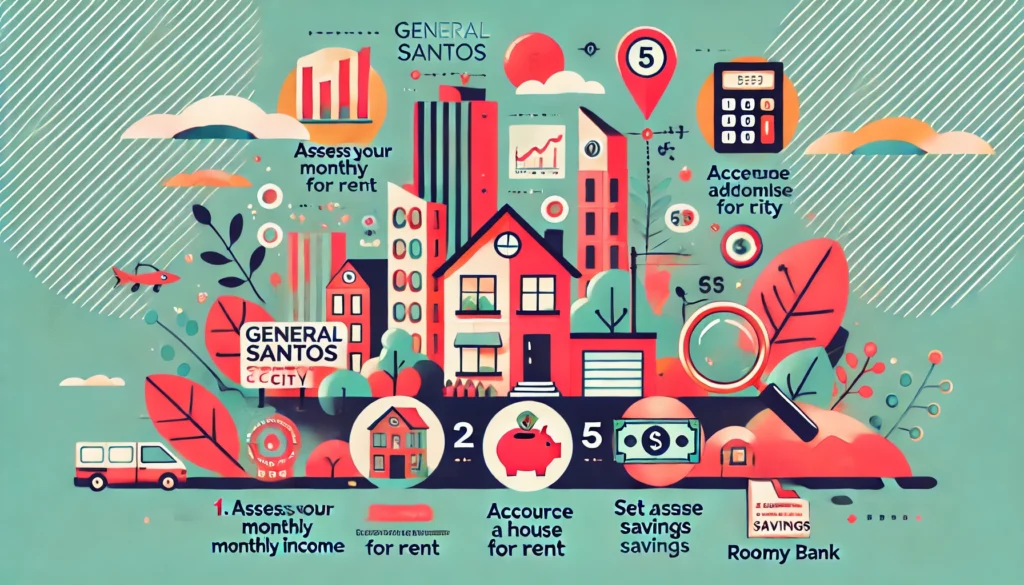
Moving to a new place can be both exciting and challenging. If General Santos City, or “GenSan,” is your destination, you’re in for a treat. Known as the “Tuna Capital of the Philippines,” this vibrant city offers a mix of urban living and laid-back charm. Whether you’re relocating for work, education, or just a change of scenery, renting a house here is a great option. But how do you budget effectively to ensure a smooth transition? This guide walks you through the essentials of budgeting for a house for rent in General Santos City.
1. Understand the Rental Market in General Santos City
Before diving into numbers, it’s crucial to get familiar with the local rental market. GenSan is a growing city, so rental prices can vary widely depending on factors like location, size, and amenities.
- Prime Locations: Central areas like Lagao, Apopong, or Mabuhay are typically more expensive because they’re closer to schools, malls, and other conveniences.
- Outskirts: Areas further from the city center, such as Tinagacan or Conel, tend to offer more affordable housing.
- Average Rental Costs: A basic one-bedroom house might cost around PHP 4,000–PHP 8,000 per month, while larger homes in prime areas could range from PHP 10,000–PHP 20,000.
2. Set a Realistic Budget
When budgeting for rent, follow the 30% rule: spend no more than 30% of your monthly income on housing. Here’s how to calculate:
- Determine Your Income: Include all sources, whether it’s a salary, freelance work, or other income streams.
- Example: If you earn PHP 20,000 per month, your budget for rent should ideally be around PHP 6,000.
- Factor in Other Expenses: Beyond rent, you’ll need to account for utilities, transportation, groceries, and savings.
3. Account for Move-In Costs
Renting a house involves more than just the monthly payment. Be prepared for these one-time expenses:
- Security Deposit: Usually equivalent to 1–2 months’ rent. For a house costing PHP 6,000/month, this means an upfront payment of PHP 6,000–PHP 12,000.
- Advance Rent: Many landlords require at least one month’s rent in advance.
- Broker Fees: If you use an agent to find a house, their fees may add another 50–100% of one month’s rent.
Total Move-In Estimate:
- Example: For a PHP 6,000 house, your initial expense could be PHP 18,000–PHP 24,000.
4. Consider Utility Costs
In GenSan, utilities are a key part of your monthly expenses. Here’s what to expect:
- Electricity: The average monthly bill for a small house is PHP 1,500–PHP 3,000, depending on usage and air conditioning.
- Water: Expect to pay PHP 300–PHP 800 monthly.
- Internet: Decent plans from providers like PLDT or Globe range from PHP 1,000–PHP 2,500 monthly.
Tip:
If possible, ask the landlord about average utility costs for the property before signing a lease.
5. Transportation Costs
While GenSan isn’t as congested as Metro Manila, transportation is still a consideration:
- Public Transit: Tricycles and jeepneys are affordable options, costing around PHP 10–PHP 30 per trip.
- Commute Distance: If you choose a house far from work or school, factor in higher transportation costs.
- Parking: Renting a house with a garage might cost more, but it could save you parking fees if you own a car.
6. Evaluate Lifestyle and Extras
The cost of living in GenSan is generally lower than in other major cities, but your personal lifestyle will influence your budget:
- Groceries: Expect to spend PHP 3,000–PHP 6,000 per month for a small family, depending on your diet and shopping habits.
- Dining Out: Meals at local eateries cost PHP 50–PHP 150, while fancier restaurants may charge PHP 300–PHP 500 per person.
- Entertainment: Occasional movie nights, shopping, or festivals might add PHP 1,000–PHP 2,000 monthly to your expenses.
7. Savings and Emergency Funds
A solid budget always includes savings. Set aside at least 10–20% of your income for emergencies or future goals. For renters, this is especially important in case of sudden repairs, job changes, or other unexpected costs.
8. Inspect the Property
Before committing, do a thorough inspection of the house to avoid future headaches:
- Structural Issues: Look for leaks, cracks, or any signs of damage.
- Utilities: Test water pressure, electricity, and internet connectivity.
- Neighborhood Safety: Visit the area at different times of day to gauge safety and noise levels.
9. Negotiate Terms
Renting a house in GenSan often comes with room for negotiation. Be polite but firm when discussing:
- Monthly Rent: Landlords might offer a discount for long-term leases.
- Inclusions: Some landlords bundle utilities or internet into the rent.
- Repairs: Request that the landlord handle any pre-existing issues before moving in.
10. Look for Deals and Alternatives
If your budget is tight, consider these options:
- Shared Housing: Rent a larger house with friends or family to split costs.
- Smaller Properties: Opt for a smaller, more affordable home and prioritize your must-haves.
- Seasonal Discounts: Landlords might lower prices during off-peak seasons.
Sample Budget Breakdown
Here’s a sample budget for a young professional earning PHP 20,000/month, renting a PHP 6,000 house:
| Category | Monthly Cost (PHP) |
|---|---|
| Rent | 6,000 |
| Utilities | 2,500 |
| Groceries | 4,000 |
| Transportation | 1,000 |
| Savings | 2,000 |
| Miscellaneous | 1,000 |
| Total | 16,500 |
This leaves PHP 3,500 for leisure or unexpected expenses.
11. Make a Checklist
To stay organized, create a checklist that covers everything from visiting properties to comparing costs. Your checklist might include:
- Shortlist of potential houses
- Notes on rental terms and conditions
- Questions to ask landlords (e.g., pet policies, parking availability)
- Documentation requirements (IDs, proof of income, references)
12. Leverage Online Platforms
GenSan’s rental market is growing, and many listings are available online. Check platforms like:
- Facebook Marketplace
- houseforrentingensan.com
- Local GenSan real estate groups
These platforms often provide photos, descriptions, and landlord contact details, making it easier to find options within your budget.
Final Thoughts
Budgeting for a house for rent in General Santos City doesn’t have to be stressful. By understanding the rental market, setting clear financial limits, and planning for additional costs, you can find a home that fits your needs and lifestyle. Remember, the key is balancing affordability with comfort and convenience. With a well-thought-out budget, you’ll be able to enjoy everything this dynamic city has to offer while living comfortably within your means.
Whether you’re a first-time renter or a seasoned tenant, these tips will help you navigate the rental process in GenSan with confidence. Happy house-hunting!



